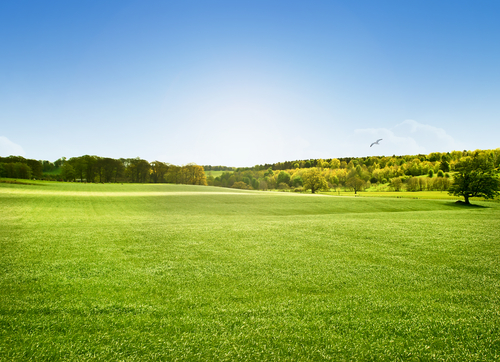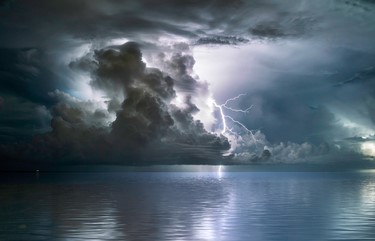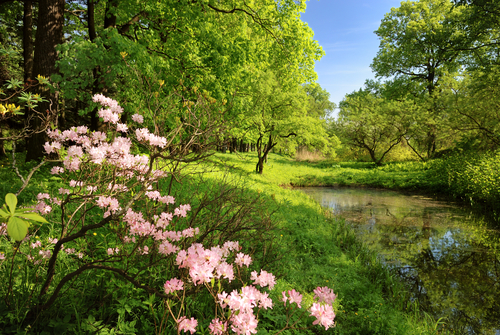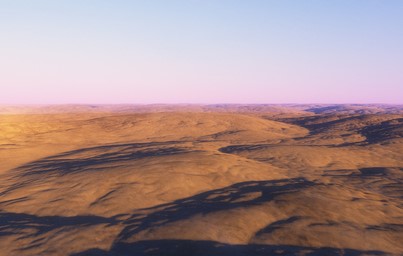Perek Shira - Chapter 1

The Heavens say, “The Heavens speak of God’s glory, and the firmament tells of His handiwork.” (Psalms 19:2)
Rashi explains that, of course, the Heavens don’t literally speak. Rather, they give us light by day and night, causing us to recite God’s praises and to thank Him for this gift.

The Earth says, “Of David, a Psalm: The Earth and everything in it are Hashem’s: the world and all who dwell in it.” (Psalms 24:1)
The Radak teaches that David composed this Psalm to be recited when the Ark was brought into the Temple. (We recite it when returning the Torah to the ark on weekdays.)
ואומר מִכְּנַף הָאָרֶץ זְמִרֹת שָׁמַעְנוּ צְבִי לַצָדִיק
And it says, “From the end of the Earth we heard songs: ‘Glory to the righteous!’” (Isaiah 24:16)
The Metzudas Dovid teaches that Isaiah and his fellow prophets heard in prophecy that at the time of the redemption there will be destruction from one end of the Earth to the other. After that, there will be glory for every righteous person.
גַּן עֵדֶן אוֹמֵר עוּרִי צָפוֹן וּבוֹאִי תֵימָן הָפִיחִי גַנִּי יִזְּלוּ בְשָׂמָיו יָבֹא דוֹדִי לְגַנּוֹ וְיֹאכַל פְּרִי מְגָדַיו
The Garden of Eden says, “Awaken, north wind, and come, south wind! Blow upon my garden and let its spices flow! Let my beloved come to his garden and eat its choice fruit.” (Shir HaShirim 4:16)
Rashi explains this verse as an allegory for the ingathering of the exiles from the lands of their dispersal. They will bring their offerings to God (their Beloved) in the Temple (His “garden”).
גֵּיהִנֹּם אוֹמֵר כִּי הִשְׂבִּיעַ נֶפֶשׁ שֹׁקֵקָה וְנֶפֶשׁ רְעֵבָה מִלֵּא טוֹב
Gehinnom says, “Because He has satisfied the longing soul, and He has filled the hungry soul with good.” (Psalms 107:9)
The ibn Ezra explains that God has satisfied the longing soul with water. He contrasts this verse with Proverbs 30:16, which tells us that the Earth is never satisfied with water. This is a sign of God’s kindness towards us.
מִדְבַּר אוֹמֵר יְשֻׂשׂוּם מִדְבָּר וְצִיָּה וְתָגֵל עֲרָבָה וְתִפְרַח כַּחֲבַצָּלֶת
The wilderness says, “The wilderness and the desert will rejoice, and the plain will celebrate and blossom like the rose.” (Isaiah 35:1)
Rashi teaches that the wilderness and the desert refer to Jerusalem and the Temple Mount, which will rejoice over the downfall of tyrants. The plain that will then celebrate and blossom is likewise Jerusalem.

The fields say, “Hashem founded the Earth with wisdom; He established the Heavens with understanding.” (Proverbs 3:19)
This verse discusses God’s wisdom and understanding; the following verse cites His knowledge. The Talmud (Brachos 55a) points out that these three attributes, which God used to build the world, He gifted to Betzalel, the architect of the Mishkan.
מַיִם אוֹמְרִים לְקֹול תִּתֹּו הֲמֹון מַיִם בַּשָּׁמַיִם וַיַּעַל נְשִׂאִים מִקְצֵה אָרֶץ בְּרָקִים לַמָּטָר עָשָׂה וַיֹּצֵא רוּחַ מֵאֹצְרֹתָיו

The Metzudas Dovid explains that, in order to “give voice” to the water in the atmosphere, God raises the clouds to the heights of the Heavens. When the clouds are seen on the horizon, He moves them adjacent to where He wills it to rain.
יָמִים אוֹמְרִים מִקֹּלוֹת מַיִם רַבִּים אַדִּירִים מִשְׁבְּרֵי יָם אַדִּיר בַּמָּרוֹם יי

The Midrash in Bereishis Rabbah says that when the seas praised God, He said, “If the seas who cannot speak praise Me thus, how much more man – who can speak – will do!” When mankind rebelled against God, He returned the sea to its previous position of dominance (i.e., in the flood).
נַהֲרוֹת אוֹמְרִים נְהָרוֹת יִמְחֲאוּ כָף יַחַד הָרִים יְרַנֵּנוּ

The Malbim explains that the rivers and mountains will rejoice in the future, when God makes changes to them as He did to the Jordan (which He split when the Jews entered Israel) and the rivers of Arnon (which ran red when God saved the Jews from an ambush).
מַעְיָנוֹת אוֹמְרִים וְשָׁרִים כְּחֹלְלִים כָּל מַעְיָנַי בָּךְ

The word מַעְיָנַי – literally, “my fountains” – is understood in various ways in this verse: “my thoughts,” “my innards,” etc. Rabbeinu Bachaye says that it comes from the word עַיִן (eye) and that David is referencing Deut. 11:12, in which God says that his metaphorical “eye” is always on Israel.



